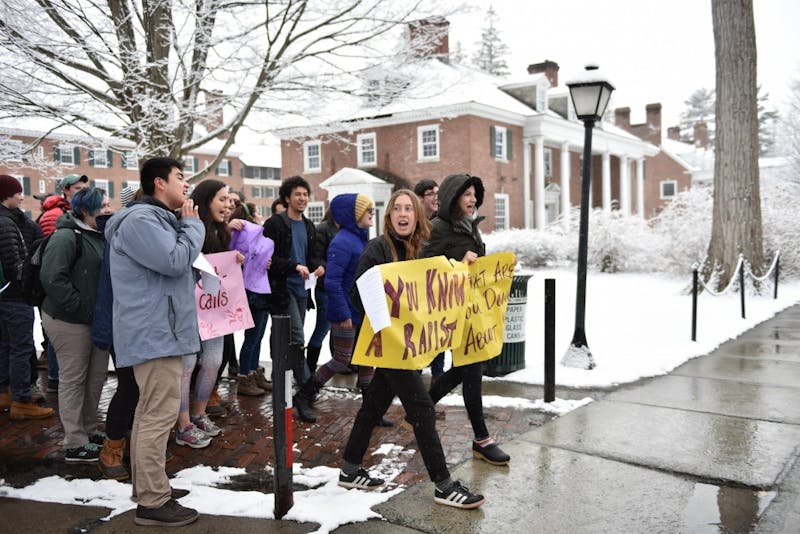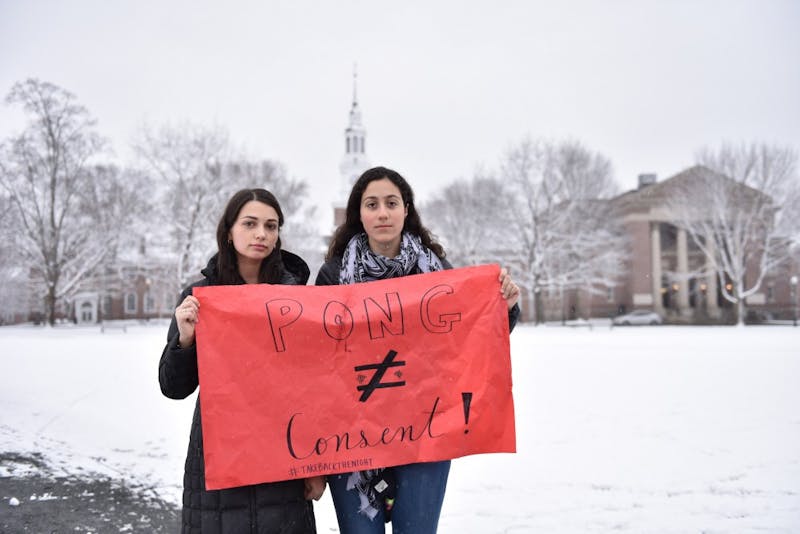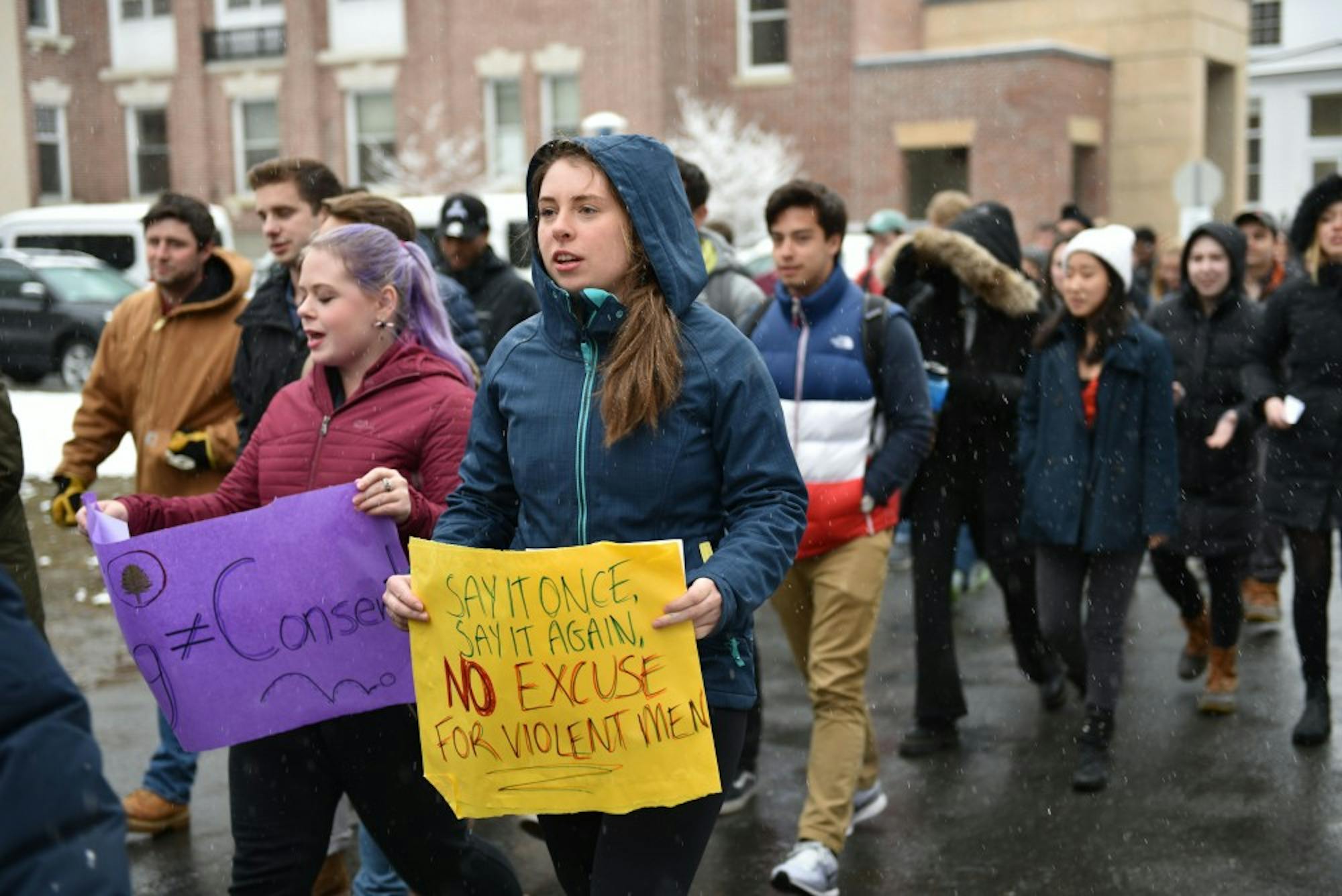In past years, the College’s annual “Take Back the Night” march only saw about a dozen people. This year on April 6, over 140 students participated and nearly all fraternity, sorority and gender-inclusive Greek houses closed their doors in solidarity with sexual assault survivors.
The annual “Take Back the Night” march serves as the culmination of Sexual Assault Awareness Month’s Week of Action. In past years, however, no more than 15-20 people showed up for the event, according to Paulina Calcaterra ’19, a member of the Week of Action planning committee.
The march began in front of the Collis Center, where Calcaterra delivered the opening remarks. She gave a brief history of the “Take Back the Night” movement, which started in the 1970s and became popular on college campuses. Calcaterra also quoted Dartmouth’s 2017 Sexual Misconduct Survey, emphasizing that the survey found that 34 percent of undergraduate women survivors described their perpetrators as someone they met at a party.
When the protesters departed from Collis and proceeded down Massachusetts Row, the students read from distributed handouts that gave suggestions for chants. Once the protesters got to Webster Avenue, they chanted, “Pong is not consent.” After marching down Webster Avenue, the march continued behind Baker-Berry library and then onto the Green, as students chanted, “Stop the violence — no more silence!” At the center of the Green, the group formed a large circle.
Maggie Flaherty ’21 delivered the event’s closing remarks. After a moment of silence for survivors, the group disbanded. Some students went back to One Wheelock, where there was a post-march reflection and dinner.
The march was preceded by a April 1 email that asked that the entire student body close its social spaces — including Greek and off-campus spaces — as a part of a “Night of Solidarity” with sexual violence survivors.
“For one night, we ask our community to think about survivors of violence, reflect on the harm that has been done, and consider potential ways to improve the safety of our social spaces on campus,” the email stated.
The email was sent by an informal coalition of students and was unaffiliated with any College organization.
The email also included a list of ideas to replace social events, including screening a film, hosting an internal or inter-group discussion or providing a space for survivors to share their stories.
The coalition reached out to Greek organizations before its campus-wide email and received positive responses to the idea, according to Calcaterra, who was a member of the coalition.
As a result, all members of the Inter-Fraternity Council closed their doors on Friday night, as did sororities, gender-inclusive houses and off-campus houses.
IFC president Yoga Acharya ’19 said that every fraternity had decided independently to close for social events, adding that he is primarily concerned with making fraternity brothers understand their role in the issue.
He emphasized the necessity of changing perceptions about sexual violence within Greek organizations.
“It isn’t just rape,” Acharya said. “There is a gray scale, and we need to recognize that.”

KDE president Dorothy Qu ’19 said that closing the sorority’s basement was an easy decision. She added that the sorority wanted to find a way to engage fraternities in its discussion of sexual assault. Qu added that KDE decided to co-host the screening of the film with Bones Gate fraternity, with which it previously had scheduled an event, in the hope of fostering dialogue, Qu said.
Zeta Psi fraternity hosted a discussion open to campus on Friday night.
Zete president Rick Dionne ’19 said that beyond internal discussions held within the house, it is important to hear from the wider Dartmouth community.
“We want to take this opportunity to get feedback and input from our community — the community of people who spend time in our social space and are friends with Zetes — about what’s working and what isn’t,” Dionne said.
According to Calcaterra, however, some sexual assault survivors were dissatisfied with how certain Greek houses framed their responses to the Night of Solidarity. These survivors felt that their assaults were being invalidated when Greek houses in which they were sexually assaulted sent out emails of solidarity, she said.
“That really concerned me, because the whole point was to be survivor-centered and to validate survivor experiences,” Calcaterra said. “I think giving houses a chance to explain why they were involved … adds a measure of accountability for the fraternities.”
Director of programming for Movement Against Violence Anne Pinkney ’20 said she thinks that the march is a powerful way to raise awareness about sexual assault.
“Take Back the Night is a visual representation of solidarity with survivors of sexual assault,” Pinkney said. “It’s a very powerful way to raise awareness about individuals who have been affected by this very pervasive issue on campus.”
March attendee Michael Harteveldt ’19 said that the march will hopefully foster action on campus.
“It is up to us to stand in solidarity with survivors and highlight the perpetuation of a culture that contributes to this problem that needs a change,” he said. “I also hope that it ignites more continued action and involvement from the Dartmouth community — especially the Greek community.”

“I don’t think that this particular march will do a lot in terms of the nationwide issue, but any action is better than nothing,” Koval said.
Ben Bradley, manager of the Dartmouth Bystander Initiative, said that historically “Take Back the Night” was for women who were experiencing harassment and violence to gather together and “reclaim the streets, reclaim the night.”
“Take Back the Night here at Dartmouth is an opportunity for members of our community to come together and say that sexual violence continues to be a critical issue that’s affecting our community,” he said.
Qu is a member of The Dartmouth Staff.




